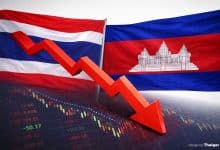Thailand set to sign free trade agreement with Sri Lanka

Prime Minister Srettha Thavisin is set to sign a free trade agreement (FTA) with Sri Lanka during his upcoming visit to the island nation this week, according to spokesperson Chai Watcharonke. This marks the 15th FTA for Thailand and the first since PM Srettha assumed office the previous year.
PM Srettha’s visit comes at the invitation of Sri Lanka’s Premier, Ranil Wickremesinghe, to partake in the country’s Independence Day festivities slated for tomorrow through Sunday. The FTA is a strategic move, intended to expand the reach of Thai commodities to fresh markets in South Asia, thereby speeding up the inauguration of gateways for trade and investment, stated Chai Watcharonke.
“Sustaining the existing markets while introducing Thai trade to newer territories aligns with our government’s proactive diplomatic policy.”
Despite its relatively small population of 22 million, Sri Lanka presents an appealing market due to its geographic position in the Indian Ocean, a pivotal point for shipping. This information was shared by the Department of Trade Negotiations (DTN).
DTN also disclosed that the total trade value between Thailand and Sri Lanka from January to October of the previous year saw a significant increase, reaching US$320.37 million (11.3 billion baht). Rubber products, fabrics, gemstones, machinery, and plastic pellets were among the primary exports from Thailand to Sri Lanka. On the other hand, jewellery, electrical components, garments, plant products, and chemicals were primarily imported from Sri Lanka, reported Bangkok Post.
Anticipations are high that the new FTA will be advantageous for Thailand’s exports of auto parts, textiles, electrical appliances, machinery, steel products, paper, processed food, and animal feed. In the following year, Thailand looks forward to finalising an FTA with the European Union.
In related news, Sri Lanka aimed to boost its economy by finalising and signing a free trade agreement with Thailand on February 3, following successful discussions in December. Bilateral trade efforts reflected economic recovery strategies.
Latest Thailand News
Follow The Thaiger on Google News:


























